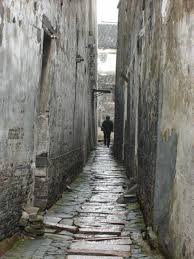narrow
英 [ˈnær.əʊ]
美 [ˈner.oʊ]
- adj. 狭窄的,有限的;勉强的;精密的;度量小的
- n. 海峡;狭窄部分,隘路
- vt. 使变狭窄
- vi. 变窄
使用频率:

记忆方法
将“narrow”与“narrow road”联想,想象一个很窄的道路,这样可以帮助记忆“narrow”意为狭窄的含义。
以上内容由AI生成, 仅供参考和借鉴
中文词源
narrow 狭窄的
来自古英语nearu,狭窄的,压抑的,来自PIE*sner,弯,转,扭曲。引申词义狭窄的。
英语词源
- narrow
-
narrow: [OE] Narrow comes from a prehistoric Germanic *narwaz, whose only other modern representative is Dutch naar ‘unpleasant, sad’ (although it also occurs in Norva-sund, the Old Norse term for the ‘Straits of Gibraltar’). It is not known for certain where it comes from, but a connection has been suggested with Latin nervus ‘sinew, bowstring’ (source of English nerve) and Old High German snuor ‘string’, which might point back to an ancestral sense ‘tying together tightly’.
- narrow (adj.)
- Old English nearu "narrow, constricted, limited; petty; causing difficulty, oppressive; strict, severe," from West Germanic *narwaz "narrowness" (cognates: Frisian nar, Old Saxon naru, Middle Dutch nare, Dutch naar); not found in other Germanic languages and of unknown origin. The narrow seas (c. 1400) were the waters between Great Britain and the continent and Ireland. Related: Narrowness.
- narrow (n.)
- c. 1200, nearewe "narrow part, place, or thing," from narrow (adj.). Old English nearu (n.) meant "danger, distress, difficulty," also "prison, hiding place."
- narrow (v.)
- Old English nearwian "to force in, cramp, confine; become smaller, shrink;" see narrow (adj.). Related: Narrowed; narrowing.
权威例句
- 1. Sailing boats lay at anchor in the narrow waterway.
- 帆船停泊在狭窄的水道上。
- 2. He squeezed through a narrow opening in the fence.
- 他从围栏上的狭窄缺口里挤了过去。
- 3. He was criticised for being boring, strait-laced and narrow-minded.
- 他被指无趣乏味,古板守旧,心胸狭窄。
- 4. The voters gave a narrow win to Vargas Llosa.
- 投票者使巴尔加斯·略萨险胜.
- 5. I hear you had a very narrow escape on the bridge.
- 我听说你在桥上险些出事。